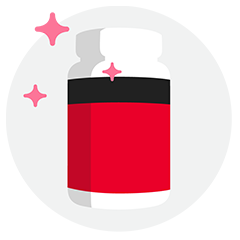A holistic approach to repairing leaky gut

Increased intestinal permeability, also referred to as leaky gut syndrome, is an intestinal condition characterized by changes to the intestinal epithelial cells. This set of cells, which make up the lining of the small and large intestine, is responsible for absorbing nutrients from the food we eat and restricting the entry of any harmful substances. These two processes are vital to our health, so it’s important to make sure our intestinal lining is in good shape. Maintaining a healthy gut lining requires a holistic approach. It all starts with learning to pinpoint the symptoms of leaky gut, and discovering which dietary and lifestyle factors may be contributing to intestinal permeability.
Why is a healthy gut lining so important?
The health of your intestinal lining is a fundamental aspect of gut health. Trillions of tiny organisms, cells, and mucus collectively act as gatekeepers to the rest of your body and carry out tasks to help keep the lining of your intestines in tip-top condition.
Your gut lining itself covers a surface area of 4,000 square feet! When it works effectively, it allows vital nutrients and substances to pass through it to reach the parts of your body which require them most. However, when the tight junctions between cells loosen, much larger molecules, such as undigested food particles, toxins, and bacterial fragments pass through these junctions and enter your bloodstream.
If your gut lining is threatened, unwanted substances that aren’t normally present in the blood are seen by the immune system as foreign. Your immune system will respond to the threat with inflammation, its first line of defense, and this will change the composition of normal bacteria in the gut. Since leaky gut is not considered a root cause, it’s important to ask: Why did it happen in the first place?
The connection between diet and gut health
One of the main drivers of chronic gut-related inflammation is our access to fast-food restaurants on every corner, and the processed foods that line the grocery store aisles. There are emerging studies suggesting that the Standard American Diet (SAD), which is low in fibre and high in sugar and saturated fats, may initiate gut imbalance.
Your gut is full of symbiotic bacteria that can support your health if you supply them with the right fuel in the form of fibre from plant foods such as fruits, vegetables, whole grains, and legumes. Dietary fibre works in a similar way as probiotics to improve the microbiome. When fibre is fermented by the gut flora, it creates a short-chain amino acid called butyrate. Research from 2015 has suggested that butyrate may stimulate mucus production and improve tight junctions in the lining of the tract.
Other eating habits that can compromise your digestive system are:
- Consuming too many processed foods
- Not eating enough high fibre and antioxidant-rich plant foods
- Consuming wheat products while having an unknown gluten-sensitivity
- Diets high in saturated fat and sugar
- Diets lacking in nutrients, like vitamin A and D, zinc, and magnesium
How does lifestyle affect gut health?
Your gut microbes are directly linked to your lifestyle and daily habits. The quality and quantity of sleep, stress levels, or alcohol consumption are all associated with changes in the gut microbiome. Here are everyday factors that can affect and compromise your digestive system:
Stress
Dealing with chronic stress without a coping mechanism in place to eliminate stressors, leads to imbalances in the gut. When you are experiencing stress of any kind –physical, emotional, or mental – your adrenal glands respond by creating a flood of stress hormones including cortisol and adrenaline. These hormones immediately put the body in a state of fight or flight meaning all systems will be focusing on short-term survival. If the stressful situation persists, your gut’s ecology will no longer be balanced, which results in harmless gut microbes becoming pathogenic in response to the constant release of stress hormones, often mutating in the process, contributing to leaky gut and infections.
It is highly recommended to reduce your stress as much as you can and find tools to manage the stress you cannot remove completely. Moderate exercise such as walking, weight lifting, yoga, or cycling can be an effective stress outlet. It’s also important to pay attention to your food when eating and to chew your food thoroughly to support proper digestive function.
Sleep
Lack of sleep hygiene with a consistent sleep-wake schedule or not enough sleep at night increases stress response and affects your gut health. Ensure you’re getting 7-9 hours of sleep every night on a consistent basis.
Fun fact: There’s 400x more melatonin made in the gut than the brain!
Approach to pain and use of painkillers
Over-the-counter painkillers are frequently used as a first choice when we experience muscle pain or headaches. Aspirin, ibuprofen, and naproxen can increase intestinal permeability by compromising the lining structurally and widening the tight junctions in your gut cell wall. This band-aid treatment approach only addresses the symptoms, without getting to the root cause of pain and can lead to further health issues in the long run.
Alcohol
Consuming too much alcohol leads to intestinal inflammation, including altering intestinal microbiota composition and function, increasing the permeability of the intestinal lining, and affecting the intestinal immune homeostasis and nutrient absorption. Keep alcohol consumption occasional (1-2 times per week) to avoid inflammation.
Symptoms of a damaged intestinal lining
When intestinal permeability increases and there is a less stable barrier between the contents of your intestine and your bloodstream, inflammation occurs, and changes in the gut flora trigger some unwelcoming symptoms. These include:
- Excessive fatigue
- Constipation, bloating or diarrhea
- Headaches, brain fog, memory loss
- Skin issues like acne, eczema, rosacea or rashes
- Joint pain and inflammation, arthritis
- Autoimmune diseases such as rheumatoid arthritis, lupus, celiac disease or Crohn’s
- Depression, anxiety, and Attention Deficit Hyperactivity Disorder (ADHD)
- Nutritional deficiencies
- Poor immune system
- Cravings for sugar or carbs
Holistic strategies to heal the intestinal lining
One of the best approaches is to consume a nutritious, unprocessed diet that includes anti-inflammatory foods to rebuild the gut lining and bring more balance to the gut flora.
Here are some great foods for keeping gut lining strong and healthy:
- Mushrooms
- Garlic and ginger
- Turmeric
- Bone broth
- Probiotic foods
- Salmon and sardines
Strategic supplementation to restore gut health
Probiotics
Probiotics perform many functions simultaneously. They repair leaky gut and the main causes of a permeable gut lining by reducing inflammation, dysbiosis (imbalance of good and bad bacteria), overgrowth, or infection. A high-quality probiotic supplement provides microbes to nourish other bacteria in the gut and keep the acidity of the gut stable. (Acidity deters pathogens and encourages the growth of your symbiotic bacteria.)
Caprylic acid
Also known as octanoic acid, caprylic acid is a naturally occurring fatty acid that comes from coconut oil. It’s known primarily for its antiviral and antifungal activity. For those who suffer from a leaky gut caused by an overgrowth of bacteria and yeast, Caproil liquid offers 525mg of GMO-free Caprylic acid, per teaspoon, a safe, effective, and natural way to address harmful bacteria and yeast overgrowth that helps your digestive environment flourish.
Sources
Leaky gut: What is it, and what does it mean for you?
Microbial butyrate and its role for barrier function in the gastrointestinal tract






